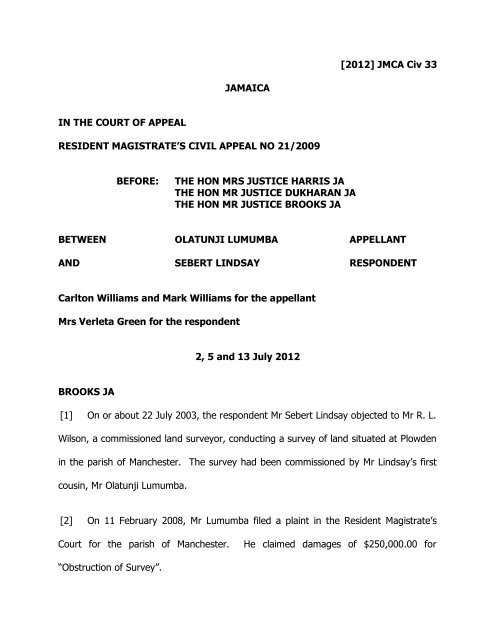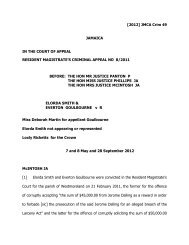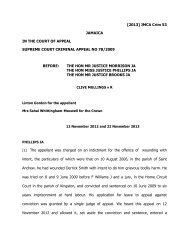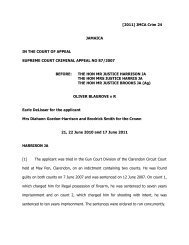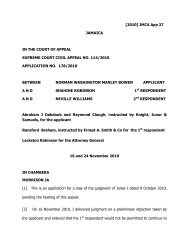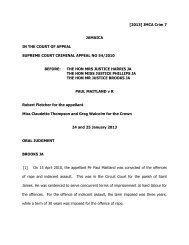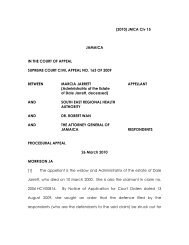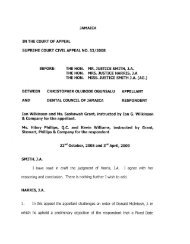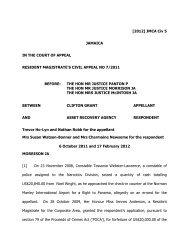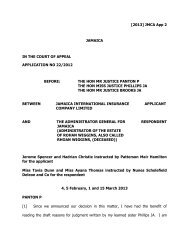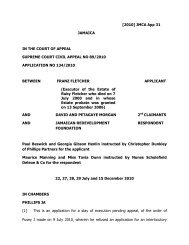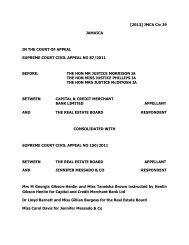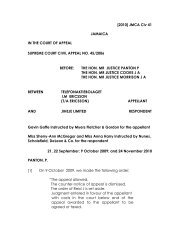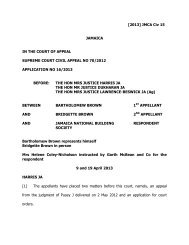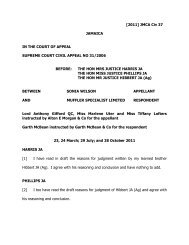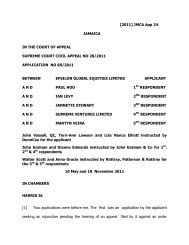Lumumba (Olatunji) v Lindsay (Sebert).pdf - The Court of Appeal
Lumumba (Olatunji) v Lindsay (Sebert).pdf - The Court of Appeal
Lumumba (Olatunji) v Lindsay (Sebert).pdf - The Court of Appeal
You also want an ePaper? Increase the reach of your titles
YUMPU automatically turns print PDFs into web optimized ePapers that Google loves.
[2012] JMCA Civ 33<br />
JAMAICA<br />
IN THE COURT OF APPEAL<br />
RESIDENT MAGISTRATE’S CIVIL APPEAL NO 21/2009<br />
BEFORE:<br />
THE HON MRS JUSTICE HARRIS JA<br />
THE HON MR JUSTICE DUKHARAN JA<br />
THE HON MR JUSTICE BROOKS JA<br />
BETWEEN OLATUNJI LUMUMBA APPELLANT<br />
AND SEBERT LINDSAY RESPONDENT<br />
Carlton Williams and Mark Williams for the appellant<br />
Mrs Verleta Green for the respondent<br />
2, 5 and 13 July 2012<br />
BROOKS JA<br />
[1] On or about 22 July 2003, the respondent Mr <strong>Sebert</strong> <strong>Lindsay</strong> objected to Mr R. L.<br />
Wilson, a commissioned land surveyor, conducting a survey <strong>of</strong> land situated at Plowden<br />
in the parish <strong>of</strong> Manchester. <strong>The</strong> survey had been commissioned by Mr <strong>Lindsay</strong>’s first<br />
cousin, Mr <strong>Olatunji</strong> <strong>Lumumba</strong>.<br />
[2] On 11 February 2008, Mr <strong>Lumumba</strong> filed a plaint in the Resident Magistrate’s<br />
<strong>Court</strong> for the parish <strong>of</strong> Manchester.<br />
He claimed damages <strong>of</strong> $250,000.00 for<br />
“Obstruction <strong>of</strong> Survey”.
[3] <strong>The</strong> claim was heard on 8 and 15 May 2009 and two weeks later, on 2 June, the<br />
learned Resident Magistrate gave judgment for Mr <strong>Lindsay</strong>.<br />
<strong>The</strong> learned Resident<br />
Magistrate accepted that the right to survey land was a part <strong>of</strong> the bundle <strong>of</strong> rights<br />
comprised in the ownership there<strong>of</strong>. He found, however, that because <strong>of</strong> the history <strong>of</strong><br />
the land in question, and the family and succession issues connected to it, Mr <strong>Lindsay</strong><br />
was “within his rights to object to a survey which failed to acknowledge his proprietary<br />
rights”. Mr <strong>Lumumba</strong> is dissatisfied with the judgment and has appealed against it.<br />
[4] It is apparent from the grounds <strong>of</strong> appeal that were filed, and on the written<br />
submissions placed before this court, that the parties, or at least Mr <strong>Lumumba</strong>, seems<br />
to be <strong>of</strong> the opinion that the learned Resident Magistrate had made a declaration that<br />
Mr <strong>Lindsay</strong> is the owner <strong>of</strong> the parcel <strong>of</strong> land in question. That view was confirmed<br />
when the parties, along with their respective counsel, appeared before us.<br />
[5] Upon airing that concern, Mr Carlton Williams, appearing for Mr <strong>Lumumba</strong>,<br />
accepted that the learned Resident Magistrate had no authority, based on the claim that<br />
was before him, to make any declaration as to ownership. Mr Williams asked however<br />
that we make the position clear by way <strong>of</strong> a written judgment.<br />
[6] We, therefore, dismissed the appeal, made no order as to costs and promised to<br />
put our reasons in writing. We now fulfil that promise. In order to make the matter<br />
plain to the parties, we shall seek to identify the issue, state the relevant law, apply the<br />
law to the instant case and set out our conclusion thereon.
<strong>The</strong> grounds <strong>of</strong> appeal<br />
[7] Mr <strong>Lumumba</strong>’s original grounds <strong>of</strong> appeal contended that the learned Resident<br />
Magistrate erred in conducting an assessment <strong>of</strong> proprietary rights to the land and<br />
making, what amounted to, a pronouncement <strong>of</strong> the ownership <strong>of</strong> the land by Mr<br />
<strong>Lindsay</strong>. <strong>The</strong> written grounds, filed by Mr <strong>Lumumba</strong>’s attorneys at law, criticised the<br />
learned Resident Magistrate for making findings that were not supported by the<br />
evidence. <strong>The</strong> grounds also complained that there was insufficient evidence on which<br />
the learned Resident Magistrate could properly make any findings as to ownership.<br />
<strong>The</strong> issue<br />
[8] <strong>The</strong> issue, which was before the learned Resident Magistrate, was whether Mr<br />
<strong>Lindsay</strong> had wrongfully objected to Mr R. L. Wilson conducting the survey <strong>of</strong> the land.<br />
A perusal <strong>of</strong> the relevant law indicates that in assessing that issue, the learned Resident<br />
Magistrate was entitled, indeed was obliged to consider, whether Mr <strong>Lindsay</strong> was a<br />
“person interested in and affected by the survey <strong>of</strong> such land” in question.<br />
<strong>The</strong> relevant law<br />
[9] <strong>The</strong> words quoted in the last sentence are from section 29 <strong>of</strong> the Land<br />
Surveyors Act (the Act). <strong>The</strong> section bestows the right to object to a survey. It states:<br />
“Where the survey is undertaken by appointment <strong>of</strong> the<br />
owner <strong>of</strong> any land then every owner <strong>of</strong> any land upon whom<br />
notice has been served, and any person interested in<br />
and affected by the survey <strong>of</strong> such land, may cause to<br />
be served upon the surveyor, prior to the completion<br />
<strong>of</strong> the survey, notice <strong>of</strong> objection, in the prescribed<br />
form, to such survey. Upon service <strong>of</strong> such notice <strong>of</strong><br />
objection the surveyor shall not proceed with the survey in<br />
so far as it affects the land in respect <strong>of</strong> which notice was
given until notice <strong>of</strong> withdrawal, in the prescribed form, is<br />
served upon such surveyor.” (Emphasis supplied)<br />
[10] Section 41 <strong>of</strong> the Act stipulates that any person who causes a notice <strong>of</strong> objection<br />
to a survey, to be served on a surveyor, without that claim being founded on an<br />
interest in land or a bona fide claim to an interest in land, is guilty <strong>of</strong> an <strong>of</strong>fence. Such<br />
an <strong>of</strong>fence does not, however, preclude any other court action being taken against the<br />
objector. Indeed, there is precedence for a civil claim being made for damages for a<br />
wrongful and unlawful stopping <strong>of</strong> a commissioned survey <strong>of</strong> land.<br />
[11] In Gurzel Buchanan v Eustace Irving (1972) 12 JLR 1036, this court<br />
considered such a claim, although it had been coupled with a claim for damages for<br />
trespass. It was held in that case, that a person, who attends on land pursuant to a<br />
notice <strong>of</strong> survey, does not, thereby, commit trespass. <strong>The</strong> court also decided in that<br />
case, that it is a valid defence to a claim for damages arising from the stopping <strong>of</strong> a<br />
survey, that the defendant had a genuine belief that he had an interest in the land to<br />
be surveyed. It did not matter, the court pointed out, that that belief subsequently was<br />
proved to be unfounded in law. Luckhoo JA, at page 1039 A, <strong>of</strong> the report said:<br />
“…once the objector who has been served with a notice [<strong>of</strong><br />
survey] bona fide claims to have, i.e. genuinely believes<br />
himself on reasonable grounds to have, an interest in<br />
the land to be surveyed it matters not that such a<br />
claim is later proved to be unfounded in law….”<br />
(Emphasis supplied)<br />
[12] <strong>The</strong> land in issue, in that case, formed part <strong>of</strong> the estate <strong>of</strong> the respondent’s<br />
father William Irving. <strong>The</strong> respondent claimed to be his father’s heir at law. William
Irving’s widow, who was the respondent’s mother, applied to have the land registered<br />
in her name and the respondent lodged a caveat against the application. <strong>The</strong> mother<br />
died without taking any further step in respect <strong>of</strong> the land. In her will, however, she<br />
devised the land to the appellant. After the mother’s death, the appellant was granted<br />
probate <strong>of</strong> the mother’s will and lived in a house on the land.<br />
<strong>The</strong> mother had raised<br />
the appellant and the respondent together, although they were not related by blood.<br />
[13] <strong>The</strong> matter became litigious when the respondent sought to have the land<br />
surveyed. <strong>The</strong> appellant said that she had been served with a notice <strong>of</strong> the survey and<br />
she attended at the appropriate time and objected to the survey. This court decided<br />
that she had a bona fide claim to an interest in the land and her objection was made in<br />
good faith. <strong>The</strong> objection was, therefore, not wrongful or unlawful.<br />
[14] <strong>The</strong> importance <strong>of</strong> that decision, for the purposes <strong>of</strong> this case, is that this court<br />
did not decide the proprietary interests <strong>of</strong> the respective parties. It merely decided that<br />
the objection was not wrongful even if it should, later, be proved that the appellant was<br />
not entitled to an interest in the land.<br />
[15] A careful reading <strong>of</strong> section 29 reveals another important principle. It is that a<br />
person need not have been served with a notice <strong>of</strong> a survey in order to object to the<br />
survey. <strong>The</strong> section allows two categories <strong>of</strong> persons to object. <strong>The</strong> first category<br />
comprises owners <strong>of</strong> adjoining land who have been served with a notice <strong>of</strong> survey. <strong>The</strong><br />
section, however, goes on to add, as a second category, “any person interested in and<br />
affected by the survey <strong>of</strong> such land”.
[16] In Buchanan v Irving, the appellant said that she had not been served with a<br />
notice. Nonetheless, the judgment spoke <strong>of</strong> an objector who had been served with a<br />
notice. In our view, however, as explained above, the service <strong>of</strong> a survey notice is not<br />
essential to entitle a person to object to that survey.<br />
Application to the instant case<br />
[17] <strong>The</strong> facts in the instant case are not dissimilar to those in Buchanan v Irving.<br />
Messrs <strong>Lumumba</strong> and <strong>Lindsay</strong> have a common maternal grandfather. <strong>The</strong>ir respective<br />
mothers were sisters. Mr <strong>Lumumba</strong>’s mother was Lucy Grant, nee Johnson, while Mr<br />
<strong>Lindsay</strong>’s mother was Anitta (Anita) Johnson. <strong>The</strong> land in question comprised three<br />
acres. <strong>The</strong>ir grandfather had willed one acre <strong>of</strong> the land to Anitta and another sister,<br />
Miriam (Merriam). He willed the other two acres to Lucy and three other sisters.<br />
[18] Mr <strong>Lindsay</strong>’s evidence before the Resident Magistrate was that his mother,<br />
Anitta, died when he was two years old and he was raised by Lucy. He testified that he<br />
was an adult when Mr <strong>Lumumba</strong>, then named Hearldon Grant, was born. He further<br />
said that Lucy lived on the property and no one disturbed her occupation. In respect <strong>of</strong><br />
his claim to the land he said that she had showed him his mother’s portion <strong>of</strong> the land<br />
and that his aunt Miriam gave him a room, adjoining a shop on the land, to live in. He<br />
said that he farmed the land for many years and then turned it over to his son, Delroy,<br />
who, he said, since 1986, and at the time <strong>of</strong> the trial, had been cultivating crops and<br />
operating a shop thereon.
[19] It does not appear that Mr <strong>Lindsay</strong> was served with a surveyor’s notice. He<br />
however attended on the date <strong>of</strong> the survey and objected. His objection to the survey<br />
was reduced to writing. It stated, in part, as follows:<br />
“I SEBERT LINDSAY do hereby object to the survey <strong>of</strong> land<br />
known as PART <strong>of</strong> PLOWDEN in the parish <strong>of</strong> MANCHESTER<br />
by R. L. WILSON Commissioned Land Surveyor at the<br />
instance <strong>of</strong> Healdon Grant for the following reasons:<br />
(1) Not the owner <strong>of</strong> land.”<br />
<strong>The</strong> notice was signed by Mr <strong>Lindsay</strong>, dated 22 July 2003, and witnessed by C Johnson.<br />
[20] Although the learned Resident Magistrate rejected Mr <strong>Lindsay</strong>’s evidence that he<br />
had cultivated the land, there was no express finding concerning Delroy’s occupying it.<br />
What the learned Resident Magistrate found was that “[i]t seems more likely than not<br />
that Lucy Grant did” point out the land to Mr <strong>Lindsay</strong>’s as belonging to Anitta. From<br />
that finding he divined that Lucy was not asserting any claim <strong>of</strong> ownership <strong>of</strong> that<br />
portion <strong>of</strong> the land.<br />
He went on to conclude that, as Mr <strong>Lumumba</strong> was claiming<br />
ownership by virtue <strong>of</strong> Lucy’s estate, that Mr <strong>Lumumba</strong>’s “assertion <strong>of</strong> ownership<br />
becomes nothing but a vacuous claim”.<br />
[21] It may be that that final statement was a strong one in the circumstances, but<br />
placed in context, it should not be understood to be a declaration <strong>of</strong> ownership <strong>of</strong> the<br />
land. <strong>The</strong> learned Resident Magistrate was aware that the court had not been asked to<br />
declare ownership. He, at page 2 <strong>of</strong> his judgment, correctly identified the issue that<br />
was to have been decided. He said:<br />
“Although he did not receive any formal notice <strong>of</strong> the survey,<br />
the Defendant [Mr <strong>Lindsay</strong>] was present on the day <strong>of</strong> the
survey. Purporting to exercise his right under section [29]<br />
the Defendant executed a notice <strong>of</strong> objection (Exhibit 2) and<br />
thereupon the surveyor acted as enjoined by section 29.<br />
That objection forms the basis <strong>of</strong> this action. So, was the<br />
objection frivolous or bona fide” (Emphasis supplied)<br />
Having identified the issue, the learned Resident Magistrate, after analysing the various<br />
issues <strong>of</strong> fact and law, reached a conclusion on that issue. He said at page 7 <strong>of</strong> his<br />
judgment, “[t]he Defendant was therefore within his rights to object to a survey which<br />
failed to acknowledge his proprietary rights”.<br />
[22] <strong>The</strong> phrases, “assertion <strong>of</strong> ownership becomes nothing but a vacuous claim” and<br />
“failed to acknowledge his proprietary rights”, we accept, would give the impression<br />
that the learned Resident Magistrate had decided Mr <strong>Lumumba</strong> had no proper claim and<br />
that Mr <strong>Lindsay</strong> had proprietary rights. Those statements were not matters to have<br />
been decided by the learned Resident Magistrate and to that extent, he would have<br />
been in error.<br />
What he should have said, is that Mr <strong>Lindsay</strong> had a claim to a<br />
proprietary right and “was therefore within his rights to object to a survey”.<br />
[23] <strong>The</strong> learned Resident Magistrate’s unfortunate phraseology should, however, not<br />
have given rise to an appeal, as he did not attempt to define what those rights were.<br />
Had the parties been properly advised, they would have been aware <strong>of</strong> the fact that, to<br />
the extent that the learned Resident Magistrate went beyond his remit in his comments,<br />
those comments should not be considered as being a part <strong>of</strong> his decision. His decision<br />
was that Mr <strong>Lindsay</strong> was within his rights to object to the survey. We find that that<br />
decision was, based on the authorities cited above, correct.
Conclusion<br />
[24] Based on the findings <strong>of</strong> the learned Resident Magistrate, Mr <strong>Lindsay</strong>, although<br />
not having been served with a notice <strong>of</strong> the survey, had, through his mother’s interest,<br />
and through his, and, with his permission, his son’s occupation <strong>of</strong> the land, a genuine<br />
belief that he had an interest in the land.<br />
[25] Following the learning in Buchanan v Irving and a reading <strong>of</strong> section 29 <strong>of</strong> the<br />
Land Surveyor’s Act, it is implicit in the learned Resident Magistrate’s findings, that Mr<br />
<strong>Lindsay</strong>’s objection to the survey was, therefore, made on the basis <strong>of</strong> a genuine claim<br />
to a portion <strong>of</strong> the land, made in good faith and was neither wrongful nor unlawful. In<br />
our view, he correctly gave judgment for Mr <strong>Lindsay</strong>.<br />
[26] We wish to make it clear, however, that neither the learned Resident Magistrate<br />
nor this court has decided the question <strong>of</strong> ownership <strong>of</strong> the land. It may well be that<br />
Mr <strong>Lindsay</strong>’s claim is not well founded, that is not for us to decide. Even if it is later<br />
decided that it was not well founded, that will not mean that the objection was a<br />
frivolous one, in the context <strong>of</strong> the Land Surveyors Act. <strong>The</strong> parties, if they cannot<br />
resolve the matter <strong>of</strong> ownership between themselves, will have to pursue other<br />
litigation in order to conclude it.<br />
[27] It is for those reasons that we ruled that the appeal is dismissed, the judgment<br />
<strong>of</strong> the learned Resident Magistrate is affirmed and there would be no order as to costs.


